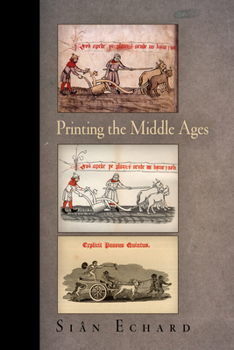Printing the Middle Ages
In Printing the Middle Ages Si n Echard looks to the postmedieval, postmanuscript lives of medieval texts, seeking to understand the lasting impact on both the popular and the scholarly imaginations of the physical objects that transmitted the Middle Ages to the English-speaking world. Beneath and behind the foundational works of recovery that established the canon of medieval literature, she argues, was a vast terrain of books, scholarly or popular, grubby or beautiful, widely disseminated or privately printed. By turning to these, we are able to chart the differing reception histories of the literary texts of the British Middle Ages. For Echard, any reading of a medieval text, whether past or present, amateur or academic, floats on the surface of a complex sea of expectations and desires made up of the books that mediate those readings.
Each chapter of Printing the Middle Ages focuses on a central textual object and tells its story in order to reveal the history of its reception and transmission. Moving from the first age of print into the early twenty-first century, Echard examines the special fonts created in the Elizabethan period to reproduce Old English, the hand-drawn facsimiles of the nineteenth century, and today's experiments with the digital reproduction of medieval objects; she explores the illustrations in eighteenth-century versions of Guy of Warwick and Bevis of Hampton; she discusses nineteenth-century children's versions of the Canterbury Tales and the aristocratic transmission history of John Gower's Confessio Amantis; and she touches on fine press printings of Dante, Froissart, and Langland.




